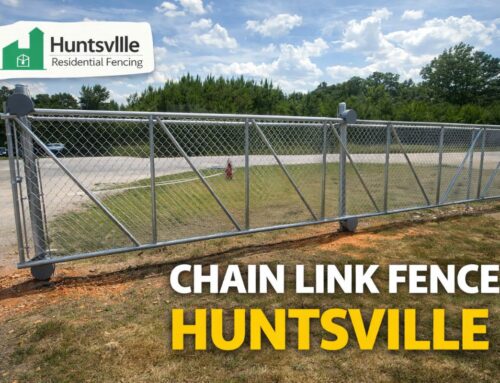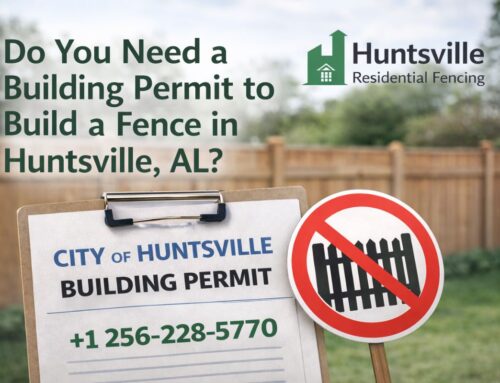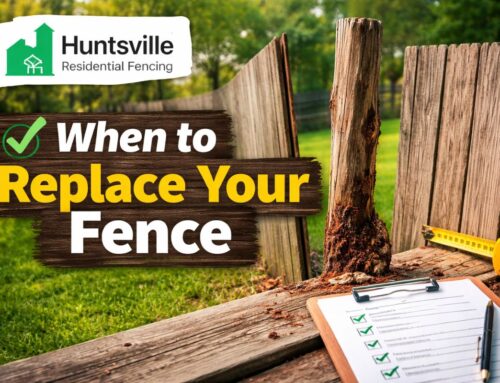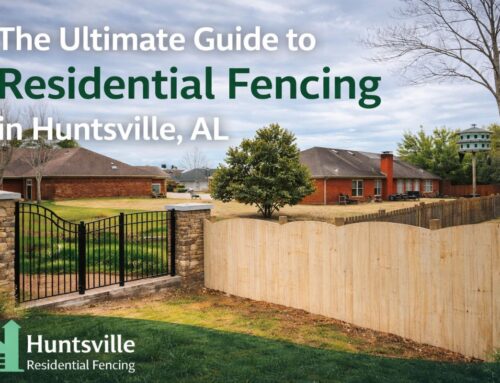PVC Fence vs Wood Fence
The clash of two distinct materials in the fencing PVC fence vs. wood fence. When it comes to choosing the right fence for your property, understanding the key differences is necessary.
With their synthetic construction, PVC fences have risen in popularity, promising low maintenance and longevity. On the other hand, traditional wood fences exude a natural charm but demand regular upkeep.
Which one is more effective at serving your needs? Let’s go into the variation of PVC and wood fences to help you make an informed decision. Discover the pros, cons, and factors to consider that will ensure your choice aligns perfectly with your fencing requirements.
What Do You Need to Know When Exploring PVC Fences?
PVC, or polyvinyl chloride, is a popular fencing material known for its durability and low maintenance. It’s a synthetic plastic material that doesn’t require painting or staining, making it a hassle-free choice for homeowners. PVC fences are resistant to rot, insects, and weather, ensuring a long-lasting and attractive fencing option. Its versatility allows for various styles, from privacy to decorative, making it a versatile choice for different needs.
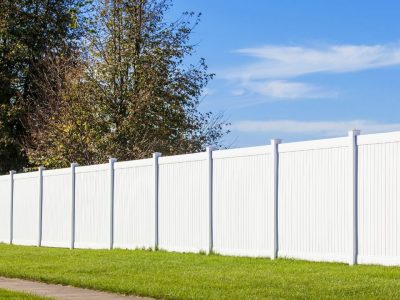
Advantages and Disadvantages of PVC Fences
| Advantages | Details | Disadvantages | Details |
|---|---|---|---|
| Low Maintenance | PVC fences require minimal upkeep. Unlike wood, they don’t need painting, staining, or sealing. A simple cleaning with soap and water keeps them looking great. | Limited Aesthetics | PVC styles and colors are available, but some homeowners may feel it lacks the natural warmth of wood. If you prefer a rustic look, PVC may not suit your taste. |
| Durability | PVC resists rot, insects, moisture, and weathering. It won’t splinter, warp, or crack, ensuring a long-lasting fence. | Environmental Impact | PVC is petroleum-based, and its production & disposal have environmental drawbacks, which may concern eco-conscious buyers. |
| Variety of Styles | Available in multiple colors and designs, making it easy to match your property’s style. | ||
| Privacy | PVC privacy fences offer excellent seclusion — ideal for backyards, pool areas, and patios. | ||
| Cost-Effective | Although the upfront cost is higher than some materials, long-term savings from low maintenance make it a cost-effective choice. |
What Do You Need to Know When Exploring Wood Fences?
Wood fences are a classic choice for homeowners. They are crafted from natural wood, offering your property a warm and rustic appeal. Wood fences can be customized to match your style and provide privacy.
However, they require regular maintenance due to their susceptibility to weather and pests. Consider the upkeep involved when opting for wood fencing.
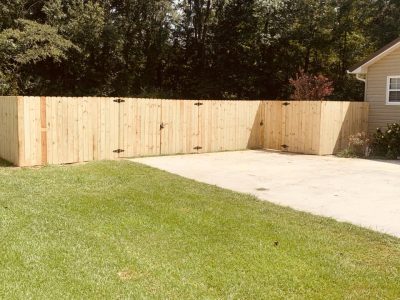
Advantages and Disadvantages Of Wooden Fences
| Advantages | Details | Disadvantages | Details |
|---|---|---|---|
| Natural Aesthetic | Offers a timeless and natural look that blends seamlessly with landscaping and architecture, providing a warm, inviting appearance. | Maintenance Requirements | Requires regular staining, sealing, and repairs to prevent rot, decay, and insect damage. |
| Customization | Highly customizable with options in wood type, stains, finishes, height, and decorative styles. | Cost Over Time | Long-term maintenance and repairs often make wood more expensive over its lifespan. |
| Privacy | Allows tall and solid designs, making it excellent for blocking visibility from neighbors or streets. | Limited Lifespan | Deteriorates faster than vinyl or metal due to weather exposure. |
| Durability | With proper maintenance, wood fences can last many years and resist pests and moisture. | ||
| Eco-Friendly | Wood is renewable and biodegradable, especially when sourced sustainably. |
Related Guide: redwood vs cedar comparison
Final Facts and Comparisons
PVC and wood fences differ in key ways. Want the full picture? Read on to weigh the pros and cons of each, so you can make the best choice for your yard.
| Aspect | PVC Fences | Wood Fences |
|---|---|---|
| Durability | Highly durable, resistant to rot | Susceptible to rot and decay |
| Maintenance | Low maintenance, no painting | Requires regular maintenance |
| Aesthetics | Modern appearance, various styles | Classic, natural look |
| Cost | Higher initial cost | Lower initial cost |
| Lifespan | Long-lasting, often lifelong | Varies based on maintenance |
| Environmental Impact | Made from synthetic materials; not biodegradable | Biodegradable and renewable when sourced ethically |
PVC Fences vs. Wood Fences: Which is Right for You?
The choice between PVC and wood fences hinges on your needs and priorities. PVC offers durability and low maintenance, but comes at a higher initial cost. Instead, wood provides a natural aesthetic and is initially more affordable but requires ongoing care. Both have their pros and cons, making the right choice dependent on your specific requirements.
FAQ
Which is better: PVC or wood fencing?
PVC fencing is low-maintenance, weather-resistant, and long-lasting, while wood offers a natural aesthetic. Choice depends on whether you prioritize durability or traditional wood appearance.
Does a PVC fence last longer than a wood fence?
Yes, PVC fences typically last 20–30 years or more with minimal upkeep, whereas wood fences generally last 10–20 years and require regular maintenance to prevent rot and insect damage.
Is a PVC fence more expensive than a wood fence?
PVC usually has a higher upfront cost than wood but saves money over time due to low maintenance, no painting, and longer lifespan, making it cost-effective long-term.
Can PVC fences withstand harsh weather better than wood?
Yes, PVC resists moisture, rot, warping, and insects far better than wood, making it more resilient in harsh weather conditions such as rain, snow, and extreme heat.
Which fence looks better — PVC or wood?
Wood offers a natural, classic look with warmth and charm, while PVC provides a clean, uniform appearance. Aesthetics depend on personal preference and the home’s style.


